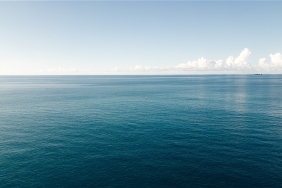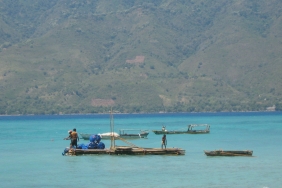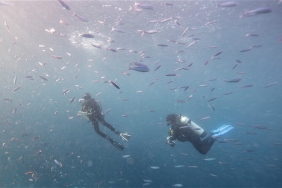NOT ORDINARY FESTIVAL, PALOH COAST HOLDS FESTIVAL FOR TURTLE CONSERVATION
Festival Pesisir Paloh (FESPA) 2024, was successfully held from June 27 - July 1, 2024, at the tail of Borneo island. Paloh is one of the longest turtle-nesting beaches in Indonesia, reaching 63 km. So important is the Paloh coastal area that the WWF Indonesia Foundation, which since 2009 has set foot in Paloh, has never failed to be involved in organizing FESPA.
In this event, WWF-Indonesia Team invited the community to carry out a beach cleanup action which was attended by approximately 600 Indonesian and Malaysian Scouts. Yuli F. Syamsuni, Marine ETP Species Specialist WWF-Indonesia said, "Through this FESPA, we invite the community to participate in practicing responsible tourism. The initial action starts by no longer littering the beach with plastic waste,". Yuli further added that this beach cleanup activity managed to collect as much as 1.5 tons of waste. This is one example that environmental conservation is the responsibility of everyone, both visitors and residents of Paloh.

In addition, WWF-Indonesia also provided technical guidance related to the release of hatchlings (sea turtle hatchlings) to Scout members. In the guidance provided, participants were equipped with a lot of knowledge about sea turtles, starting from the introduction of sea turtle species, sea turtle behavior, sea turtle nesting areas, to how to interact when watching sea turtles lay eggs. After the participants received the materials, they were then involved in the hatchling release program.
This special activity is indeed the magnet of the entire FESPA series so far. Furthermore, the Pontianak Coastal and Marine Resources Management Center (BPSPL), Iwan Taruna Alkadrie added that this activity is very useful to teach and train the next generation to protect the environment and the potential of natural resources and traditions owned
"This is my first experience releasing hatchlings. It gives a positive impression for Malaysian scouts like me," said Mohd Haziq Bin Noraffendi, one of the Malaysian scouts. Hundreds of Indonesian and Malaysian Scouts lined up along the beach holding coconut shells used as hatchling containers, then slowly released the hatchlings into the sand, letting them find their own way to the sea.

An equally important program in FESPA is the monitoring of turtle nesting beaches. Participants have the opportunity to walk along the beach at night. This monitoring activity cannot be done carelessly, so WWF-Indonesia and the community group Wahana Bahari Paloh impose strict rules during turtle nesting monitoring. This is because when the atmosphere is crowded and bright, sea turtles do not want to approach the coast.
"We are very proud and salute Wahana Bahari for faithfully and steadfastly implementing the SOP for sea turtle monitoring. Some of its members who used to be turtle egg hunters have now turned 180 degrees into turtle egg guardians," said Yuli.
Zulfian, Chairperson of the Wahana Bahari Paloh Group said, "This year's activity brought many positive impacts both from MSMEs, the community, and me personally as chairman of Wahana Bahari Paloh because many people visited to enliven the event. Hopefully, FESPA will stay lit so that it can continue to carry the message to protect sea turtles, protect nature and protect life."
Please visit https://bit.ly/PenyuPalohWWF for more information about Paloh.
"This activity also focuses on fostering the younger generation in West Kalimantan, through environmental education which is the next generation in protecting the environment and the potential of natural resources and traditions owned", said Head of BPSPL Pontianak, Sy. Iwan Taruna Alkadrie.





